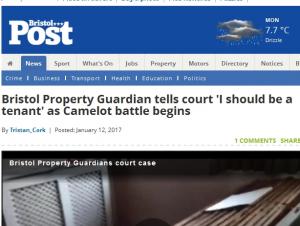



News stories in the Bristol Post have been reporting a potentially landmark case, the outcome of which hinges on whether Property Guardians are licensees or tenants. The guardian in this case is resisting an eviction order on the basis that the guardians each have a lockable room and therefore have exclusive possession, regardless of what the occupation agreement might say. Camelot is relying in part on the 'licence agreement' to assert that the occupants are licensees.
The Bristol Post reporting seems has been supportive of the Property Guardians, with an earlier story referring to the situation as a 'scandal'. The latest story is dated January 12th (other stories are cited in the article). It is understood that the case is to resume on 8th February.
Some spice is added to the story by the fact that the property in question is a council-owned ex-nursing home, and that the Cabinet Member for Housing has stated his concern about the council's role.
Another interesting facet of the case seems to be that the guardians have an occupaton agreement with one Camelot subsidiary whilst the agreemeent between Bristol City Council and Camelot is with a different Camelot subsidiary. This raises the possibility that the latter subsidiary may attempt to regain possession on the basis that the guardians have no legal right to be in occupation, regardless of the status of the agreement with the other subsidiary. The reporting of this aspect is fairly different between the news story in the Bristol Post and the much more polemical report in the Bristolian (an organ which announces itself as a 'Smiter of the High and Mighty'). The latter story is more coherent.
The saga has also been picked up by Giles Peaker, a lawyer who has written numerous times on the issues associated with the property guardian model in his Nearly Legal blog. The latest developments were discussed in a recent blog post here which points out the parallels with the famous Street v. Mountford case.
Yet another facet of the story is that Camelot's barrister suggested that the property guardians were trying to discredit Camelot because they had wished to form a competing firm and displace Camelot from its contract with the council. Regardless of whether this is true, it is difficult to see how it impinges on the merits of the guardian's case except insofar as it is capable (or not) of calling into question the reliability of the evidence presented by the guardian.
NOTE: - Disclosure of Interests
1. .Ad Hoc Property Management, a Property Guardian firm, sponsors the National Empty Homes Conference organised by the Empty Homes Network.
2. The author's brother is a Property Guardian with Ad Hoc Property Management.
1. .Ad Hoc Property Management, a Property Guardian firm, sponsors the National Empty Homes Conference organised by the Empty Homes Network.
2. The author's brother is a Property Guardian with Ad Hoc Property Management.
